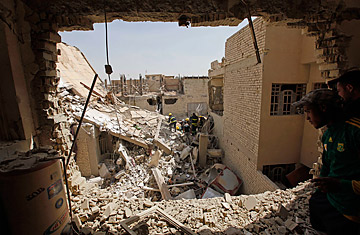
Rescuers search for survivors at the scene of the April 6, 2010, suicide bomb attacks in Baghdad.
"I knew you were back in Baghdad," my Iraqi friend said when I phoned on April 4. I had flown in earlier that morning, and shortly after that, three car bombs had exploded outside embassies in the capital. "You are bad luck," he said with a laugh. It was our inside joke ever since January, when his father and I were nearly blown up after a suicide bomber in a white minibus detonated himself outside a hotel we had just entered.
My luck — and Baghdad's — didn't get better. On Tuesday, at least seven apartment buildings were leveled by explosives that had been planted inside them. One of them had a lovely tea shop on the roof. Nothing makes sense in Iraq right now. High-profile attacks are becoming more frequent, but U.S. officials say it is just proof that al-Qaeda is desperately lashing out and thus on its last legs.
U.S. officials stress the fact — and it is a fact — that both the number of terrorism attacks and the overall death toll have decreased to a level not seen since just after the March 2003 invasion. But statistics are cold comfort when the latest explosion has leveled a nearby building. Surviving yet another attack leaves Iraqis raw and emotional and angry. "We think they are still under the ruins, kids and young boys," says Jasim Talib Khalil, 43, a father of four who lives in the north-central Alawi neighborhood, close to the National Museum, near a bombed apartment building with a bustling video-game and coffee shop inside it. "We do not understand what is going on and what to do. We are not safe even in our homes. Today bombs bring us back to the past years when there were mortars and attacks in the residential areas."
Khalil is referring to the sectarian violence that handcuffed the city to hell in 2006 and 2007. Today the citizens of Baghdad cannot help but see causes for alarm. U.S. forces, barred by a 2008 security agreement from entering the capital without an Iraqi invitation, have been called to assist with the investigation into the recent bombings. U.S. military and law enforcement are working shoulder to shoulder with Iraqis for on-the-job training in intelligence gathering and sharing and crime-scene investigation. Bombs that had been rigged at two houses were disabled on Tuesday based on tips, and nearly a dozen people have been arrested by Iraqi security forces based on confessions related to earlier bombings.
U.S. officials in Iraq are adamant, however, that there are no parallels between now and then. "As long as the Iraqi people continue to reject violence, al-Qaeda will defeat themselves," says Lieut. Colonel Eric Bloom, a U.S. military spokesman. On Monday, another U.S. military spokesman and two U.S. commanders called me up to insist that there will not be a security devolution to the bad old days when bodies of Sunnis and Shi'ites littered the streets.
"There's no common thread of targets, no specified targets," says Bloom, when asked if the attacks over the past few days are omens of worse things to come. "It reflects a typical pattern that al-Qaeda has used before, and that's why we continue to say it's al-Qaeda and not sectarian attacks." U.S. officials insist that to understand Iraq properly, observers must somehow consider each new deadly day as a last-ditch effort of a "spent political force," as Gary Grappo, political counselor at the U.S. embassy, refers to al-Qaeda.
At least 35 people were killed in Tuesday's explosions; 41 were killed outside the Egyptian and Iranian embassies and German ambassador's residence on April 4; 25 Iraqis were killed execution-style in a southern Baghdad village in the early morning of April 3; 59 were killed in two bombings in Diyala province on March 26, the day when results of the country's March 7 parliamentary elections were announced; and 40 were killed — including in two apartment bombings — on election day itself, which Bloom says had "no significant attacks." In the walk-up to the vote, 40 were killed in car bombs in Karbala in February, and 36 died on Jan. 25, when car bombs targeted three hotels in Baghdad (including the one that nearly got me and my friend's father). Substantial attacks, at nearly a once-a-month rate, can be traced back to August 2009, when two truck bombs hit the finance and foreign ministries and killed 101 people. Al-Qaeda in Iraq and elements of the former Baathist regime have either taken credit or been blamed for all of these.
Meanwhile, Iraq's political parties are trying to cobble together a coalition government out of the results of the March 7 elections, which produced no clear-cut winner. (Sectarian divisions still define the political scene. A Sunni-supported bloc just barely accumulated the most seats — though nothing close to a majority in the legislature — and is fighting to form a government in the face of a multitude of Shi'ite representatives.) Every organization issued statements or interviews condemning the attacks, using them to take shots at rival groups. "The best solution for Iraq is that the winning political blocs should quickly form the new government without marginalizing any party," says political analyst Hussein al-Ja'af. He contends that the terrorism attacks won't derail the political process, though he warns that three days this month coincide with the birth and overthrow of Saddam Hussein and the establishment of the Baath Party and could bring more attacks. "They make violence to confuse people about the democratic experience that Iraqis have now."
Just our luck.
